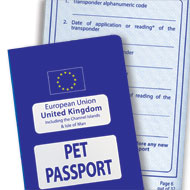Pet passport scheme review underlines disease concerns

Sixty-nine per cent said the passport scheme had come with undesirable effects, such as illegal puppy imports and an increased risk of disease being imported to the UK.
More than two thirds of veterinary surgeons rate the effectiveness of the pet passport scheme in protecting animals and humans from rabies and other diseases, as ‘poor’.
This is according to the results of a consultation, launched by Defra last year as part of its review of the Non-Commercial Movement of Pet Animals Order 2011.
Out of 90 responses to the consultation, the majority came from pet owners (52 per cent) and vets (34 per cent).
Nearly 75 per cent of respondents said the order made it easier to travel with pets (rated as excellent, very good or good). The most frequent comments were that harmonisation with the EU scheme made the process simpler, reduced waiting times and costs.
However, 69 per cent said it had come with undesirable effects, such as an opportunity for puppies to be illegally imported and an increased risk of disease being imported to the UK, particularly through imported ticks. Other concerns were the welfare issues associated with illegally imported pets, and increased pressure on local authorities and Trading Standards.
All in all, 40 per cent of the respondents rated the order as ‘poor’ in protecting human and animal health from rabies and other diseases, while 70 per cent of vets gave it this rating.
Reasons cited for this rating were: the relative ease of concealing undeclared pets at the UK border; the large number of puppies entering the UK below the minimum age of 15 weeks; and the removal of tick controls, leading to an increased risk of serious zoonotic diseases, such as ehrlichiosis and babesiosis. In addition, the 21-day wait after rabies vaccination was felt to be insufficient for an effective immune response.
There was broad agreement among the vets who responded, that the removal of tick controls had led to documented incidents of exotic ticks and disease, such as the cluster of babesiosis cases in Essex. The majority felt that mandatory tick treatment for travelling pets should be reinstated, and 13 said the passport scheme should also cover canine leishmaniasis.
Sixty-four per cent of respondents agreed that the mandatory treatment for Echinococcus multilocularis, one to five days before entry to the UK, should remain. Some vets and animal welfare organisations called for the time period to be reduced to 24-48 hours.
Responding to the summary of responses, the Dogs Trust said: ’The review of the legislation on pet travel is a crucial opportunity to propose vital amends to the existing legislation that we know is failing. We urge the Government to take on board the various concerns expressed by Dogs Trust and other stakeholders, as outlined in the summary of responses, and to put forward a review document with clear proposals to improve this failing legislation.
‘This would include increasing penalties for those illegally importing puppies and a significant overhaul of the pet checking system at ports. Dogs Trust has been campaigning on this issue since 2014, yet to date our recommendations have not been acted upon. Sadly the summary indicates no urgency in tackling the issues that have arisen, including the illegal importation of puppies.’
Defra thanked those who took part in the consultation and said the information gathered would be used in the coming months to inform its review of the legislation.



 The RCVS has announced a new version of its 1CPD mobile app, with enhanced features for veterinary surgeons and veterinary nurses to record their continuing professional development.
The RCVS has announced a new version of its 1CPD mobile app, with enhanced features for veterinary surgeons and veterinary nurses to record their continuing professional development.